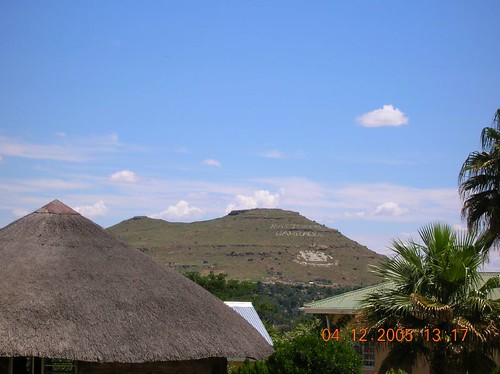Quelques details historiques sur le Lesotho, un petit pays que je visite brievement cette semaine.
- XVIème siècle : arrivée des Sotho dans cette partie de l'Afrique alors peuplée de quelques autres ethnies avec qui ils se mélangèrent.
- début XIXème siècle : Arrivée des premiers commerçants blancs dans la région (appelée désormais Basutoland).
- 1820 : le roi Moshoeshoe, afin de lutter contre les raids zoulou, unifie les tribus sotho.
- 1840-68 : lutte des Sotho contre les Boers (colons d'origine néerlandaise d'Afrique du Sud) qui veulent s'approprier leurs terres.
- 1868 : afin de se protéger des Boers, Moshoeshoe demande l'aide des Anglais qui établissent un protectorat sur le territoire.
- 1899-1902 : guerre des Boers et victoire anglaise en Afrique du Sud.
- début-mi XXème siècle : malgré la création de l'Union Sud-Africaine en 1910 et de la république d'Afrique du Sud en 1961, le Basutoland (Lesotho) demeure à part sous contrôle britannique.
- 1966 : le pays devient indépendant dans le cadre du Commonwealth sous le nom de Lesotho.
- 1970 : perte du pouvoir par le roi qui de fait n'occupe plus qu'un poste honorifique au profit de son Premier ministre.
- 1986 : coup d'état militaire qui redonne ses pouvoirs au roi.
- 1993 : après une période mouvementée, retour des civils à la tête du pays.
- 1998 : début de guerre civile suite à des élections contestées et intervention de l'Afrique du Sud qui rétablit plus ou moins le calme.
Courtoisie de Africa On Web
Some historical detail about Lesotho, the small country I am briefly visiting this week.
San (Bushmen), who were the region's earliest known inhabitants, were supplanted several centuries prior to colonization by various Bantu-speaking peoples, including those that came to be the Sotho and the Zulu. The Sotho are made up of remnants of ethnic groups that were scattered during the disturbances accompanying the rise of the Zulu (1816-30).
They were rallied c.1820 by Moshoeshoe , a commoner who founded a dynasty in what is now Lesotho. Moshoeshoe not only defended his people from Zulu raids but preserved their independence against Boer and British interlopers. He also welcomed Catholic and Protestant missionaries.
Following wars with the Boer-ruled Orange Free State in 1858 and 1865, Moshoeshoe put the Sotho under British protection (1868), establishing the protectorate of Basutoland. The protectorate was annexed to Cape Colony in 1871 without Sotho consent, but in 1884 it was placed under the direct control of Britain.
When the Union of South Africa was forged in 1910, Basutoland came under the jurisdiction of the British High Commissioner in South Africa. Provisions were made for the eventual incorporation of the territory into the union, but Sotho opposition, especially after the rise of the Nationalist party with its apartheid policy, prevented annexation.
In 1960 the British granted Basutoland a new constitution that paved the way to internal self-government. On Oct. 4, 1966, Basutoland became independent as Lesotho. Following general elections in early 1970, which the opposition Basutoland Congress party (later the Basotho Congress party; BCP) apparently won, Prime Minister Leabua Jonathan declared a state of emergency and suspended the constitution.
King Moshoeshoe II went into exile but returned at the end of the year, thereafter serving largely as a figurehead. In 1973 an interim assembly began work on a new constitution, but the BCP, led by Ntsu Mokhehle, refused to participate. In Jan., 1974, Jonathan accused the BCP of attempting to stage a coup; the party was outlawed and hundreds of its members reportedly killed.
Armed clashes between the Lesotho Liberation Army (the militarized segment of the BCP) and the government were common throughout the 1970s and 80s. In the late 1970s, Jonathan exploited growing popular resentment of South Africa and its policies of apartheid. South Africa responded by organizing economic blockades and military raids against Lesotho. Maj. Gen. Justinus Lekhanya led a coup in 1986 that installed King Moshoeshoe II as head of state. After prolonged disputes with Lekhanya over power, the king went into exile.
In 1990, Moshoeshe II's son, Letsie III, became king but was reduced to a purely ceremonial role. Lekhanya was overthrown (1991) in a bloodless coup, and Col. Elias Tutsoane Ramaena came to power as chairman of a six-member military council. A free election in 1993, the first in 23 years, resulted in a BCP landslide, and Ntsu Mokhehle became prime minister. In 1994 fighting between two rival army factions unsettled the young democracy; the king ousted Mokhehle but was pressured by other S African nations to reinstate him.
In Jan., 1995, Letsie abdicated in favor of his father, Moshoeshoe II. After Moshoeshoe was killed in an automobile accident in Jan., 1996, Letsie was restored to the throne. In 1997, Mokhehle remained prime minister as he broke from the BCP and founded the Lesotho Congress for Democracy party (LCD), reducing the BCP to the opposition. Mokhehle died in Jan., 1998; new elections were called in May, and Pakalitha Mosisili of the LCD secured the prime ministership. Demonstrators charging election fraud staged violent protests in Maseru, causing severe damage.
In Sept., 1998, South Africa and Botswana sent troops into the country to restore order, and in Oct. the government and the opposition agreed to form a transitional body to organize new elections within 18 months. Elections were held in May, 2002, under a revamped electoral system designed to increase opposition representation in the parliament. The LCD again won the elections. The effects of a three-year drought led Prime Minister Mosisili to appeal for international food aid in early 2004.
Courtosy of Encyclopedia.com


No comments:
Post a Comment